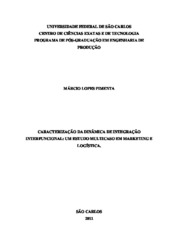| dc.contributor.author | Pimenta, Márcio Lopes | |
| dc.date.accessioned | 2016-06-02T19:50:14Z | |
| dc.date.available | 2012-02-02 | |
| dc.date.available | 2016-06-02T19:50:14Z | |
| dc.date.issued | 2011-12-09 | |
| dc.identifier.citation | PIMENTA, Márcio Lopes. Caracterização da dinâmica de integração interfuncional: um estudo multicaso em marketing e logística. 2011. 232 f. Tese (Doutorado em Ciências Exatas e da Terra) - Universidade Federal de São Carlos, São Carlos, 2011. | por |
| dc.identifier.uri | https://repositorio.ufscar.br/handle/ufscar/3387 | |
| dc.description.abstract | Marketing and Logistics have a high need for integration because they compose contact points that influence the synchrony of operations with market needs. The literature in this area predominantly focuses on the elements that generate integration, and the correlation of those elements with functional and organizational results. However, there is a theoretical gap related to the characterization of the inter-functional integration dynamics between Marketing and Logistics and the integration elements. This research aimed to characterize the interfunctional integration dynamics between Marketing and Logistics. The elements that compose the integration dynamics are identified and characterized. The key elements related to inter-functional integration dynamics that were identified in the literature include contact points, integration factors, integration level, formality/informality of integration processes, and integration impacts. In order to better characterize these elements, five case studies were conducted in manufacturing companies, from different industries: Chassis and Wheels, Agriculture Chemicals, Beverages, Soybean Oil and derivates, Oral Care Products. The indepth interviews considered both Marketing and Logistics perspectives. The analysis identified similarities and differences in the characteristics of the Marketing and Logistics inter-functional integration dynamics. Practical definitions were established for contact points, integration factors, integration levels, integration formality/informality, and impacts generated by integration. The investigation of these elements within organizations may facilitate integration efforts between Marketing and Logistics, reducing conflicts and improving the companies' performance. | eng |
| dc.format | application/pdf | por |
| dc.language | por | por |
| dc.publisher | Universidade Federal de São Carlos | por |
| dc.rights | Acesso Aberto | por |
| dc.subject | Engenharia de produção | por |
| dc.subject | Interação | por |
| dc.subject | Colaboração | por |
| dc.subject | Pontos de Contato | por |
| dc.subject | Integração Interfuncional | por |
| dc.subject | Marketing | por |
| dc.subject | Logística | por |
| dc.subject | Inter-functional Integration | eng |
| dc.subject | Marketing | eng |
| dc.subject | Logistics | eng |
| dc.title | Caracterização da dinâmica de integração interfuncional: um estudo multicaso em marketing e logística | por |
| dc.type | Tese | por |
| dc.contributor.advisor1 | Silva, Andrea Lago da | |
| dc.contributor.advisor1Lattes | http://genos.cnpq.br:12010/dwlattes/owa/prc_imp_cv_int?f_cod=K4728583H0 | por |
| dc.description.resumo | As funções de Marketing e Logística têm elevada necessidade de integração, pois possuem pontos de contato que influenciam a sincronia das operações com as necessidades de mercado. Entretanto, essas duas funções têm frequentes conflitos de objetivos e a solução destes pode aprimorar os resultados nas organizações. A literatura nesse tema, de forma predominante, evidencia elementos que geram integração, correlacionando-os com resultados funcionais e organizacionais. Há, porém, uma lacuna teórica no que se refere a caracterização da dinâmica de integração interfuncional entre Marketing e Logística e dos elementos que a compõem. O objetivo dessa pesquisa consiste em caracterizar a dinâmica de integração interfuncional entre Marketing e Logística. Os elementos que compõem a dinâmica de integração foram identificados e caracterizados. Cinco elementos-chave relacionados à dinâmica de integração interfuncional foram identificados na literatura: pontos de contato, fatores de integração, nível de integração, formalidade/informalidade da integração e impactos da integração. No intuito de caracterizar estes elementos, foram realizados cinco estudos de caso, em empresas industriais de diferentes setores: Chassis e Rodas, Agroquímicos, Bebidas, Óleo de Soja e Derivados, Produtos de Higiene Bucal. Entrevistas em profundidade foram utilizadas para abordar as perspectivas de Marketing e de Logística. A análise permitiu identificar similaridades e diferenças nas características da dinâmica de integração interfuncional de Marketing e Logística. Foram estabelecidas definições práticas para pontos de contato, fatores de integração, nível de integração, formalidade/informalidade da integração e impactos da integração. A investigação desses elementos dentro das organizações pode facilitar os esforços de integração entre Marketing e Logística, reduzindo conflitos e melhorando o desempenho das empresas. | por |
| dc.publisher.country | BR | por |
| dc.publisher.initials | UFSCar | por |
| dc.publisher.program | Programa de Pós-Graduação em Engenharia de Produção - PPGEP | por |
| dc.subject.cnpq | ENGENHARIAS::ENGENHARIA DE PRODUCAO | por |
| dc.contributor.authorlattes | http://lattes.cnpq.br/30269275813428 | por |
